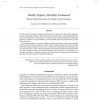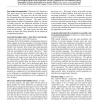19 search results - page 2 / 4 » Using Template Haskell for Abstract Interpretation |
SAS
1994
Springer
13 years 9 months ago
1994
Springer
Strictness analysis has been a living field of investigation since Mycroft's original work in 1980, and is getting increasingly significant with the still wider use of lazy fu...
CAV
2010
Springer
13 years 5 months ago
2010
Springer
We define and study a new abstract domain which is a fine-grained combination of zonotopes with (sub-)polyhedric domains such as the interval, ocinear template or polyhedron domain...
APLAS
2007
ACM
13 years 9 months ago
2007
ACM
We have built the first family of tagless interpretations for a higher-order typed object language in a typed metalanguage (Haskell or ML) that require no dependent types, general...
CJ
2004
13 years 5 months ago
2004
act interpretation. R. Barbuti, C. Bernardeschi and N. De Francesco With mobile technology more and more prominent, the problem of security leakages becomes more and more important...
PLDI
2005
ACM
13 years 11 months ago
2005
ACM
Concepts are an essential language feature for generic programming in the large. Concepts allow for succinct expression of constraints on type parameters of generic algorithms, en...


